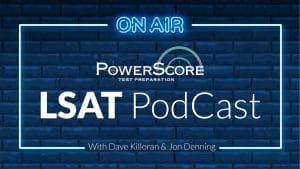So far in this mini series, we have covered Question-by-Question Difficulty and Individual Question Difficulty. These have largely covered the individual questions within a section on Logical Reasoning on the LSAT. In this post, I am focusing my efforts to discuss overall difficulty in the LR section. Following that, I'll address how that figures into the creation of an LSAT. Overall Difficulty by the Numbers For this, we are using the … [Read more...]
Individual Question Difficulty in Logical Reasoning
In my last post, I discussed question-by-question difficulty in LSAT Logical Reasoning sections. Continuing in that same vein, let’s look inside the statistics a bit further. When you examine the difficulty rating for individual questions and sections, you can make several useful inferences. The First Question The first question is always easy or relatively easy (seven of the eight sections under discussion began with a level 1 (easy) … [Read more...]
Question-by-Question Difficulty in Logical Reasoning
In Logical Reasoning on the LSAT, there is a question many students ask. How does the difficulty of the questions change as the section progresses? In our courses and books, we delve into this point in some detail. Here, I’m going to give a brief overview of how difficulty changes throughout the section. Where Our Data Comes From Before addressing the questions, a note about the statistics we use. You might ask how we derive our information and … [Read more...]
What to Trust and What to Question in LSAT Logical Reasoning
One of the most common questions test takers ask when considering LSAT Logical Reasoning is "How do I know what information I can accept as fact?" So let's consider what information you should question or approach with skepticism.This very question came up on our Forum. A student considered a question from the second LR section, #24 on the February 1994 LSAT. This question discusses investments and the relationship of inflation to … [Read more...]
Flaws in Logical Reasoning Part X: Time Shift Errors
[Further Reading in Flaws in Logical Reasoning: Part 1, Part 2, Part 3, Part 4, Part 5, Part 6, Part 7, Part 8, Part 9, Part 10] As we finish up this series on common flaws in logical reasoning, here's a reminder of where we started.The majority of LSAT Logical Reasoning questions have an argument in their stimulus and most will contain some sort of flawed reasoning. In this series, we will address a variety of the flaws that tend to … [Read more...]
Flaws in Logical Reasoning Part IX: Appeal to Emotion
We're at the final stretch! Before we can get to Part 9, here's a recap on our purpose as stated in the first post on Source Arguments.The majority of LSAT Logical Reasoning questions have an argument in their stimulus and most will contain some sort of flawed reasoning. In this series, we will address a variety of the flaws that tend to appear with some frequency. I’ll examine common mistakes that authors on the test make. This should … [Read more...]
Flaws in Logical Reasoning Part VIII: Appeal to Authority
Before continuing on to Part Eight of our flaws in LR on the LSAT, let’s review once more. Here’s how I began the first post in this series, where we looked at Source Arguments: The majority of LSAT Logical Reasoning questions have an argument in their stimulus and most will contain some sort of flawed reasoning. In this series, we will address a variety of the flaws that tend to appear with some frequency. I’ll examine common mistakes that … [Read more...]
Flaws in Logical Reasoning Part VII: Internal Contradiction
Part 7 is here! But before we get going on the topic of internal contradiction, let's start with a review the importance of this series Take a look at how I began the first post, where we looked at Source Arguments. The majority of LSAT Logical Reasoning questions have an argument in their stimulus and most will contain some sort of flawed reasoning. In this series, we will address a variety of the flaws that tend to appear with some frequency. … [Read more...]
Flaws in Logical Reasoning Part VI: Uncertain Use of a Term
Welcome back to our series on some of the common flaws you'll find in LR questions on the LSAT! We're already half way through and heading on to Part 6! Let's remember our roots with how I began the first post on Source Arguments in this series: The majority of LSAT Logical Reasoning questions have an argument in their stimulus and most will contain some sort of flawed reasoning. In this series, we will address a variety of the flaws that tend … [Read more...]
Flaws in Logical Reasoning Part V: False Dilemma
Part Five of our series examining common flaws in LR questions is here! But, before we continue, here's a recap of our mission as stated in the first post on Source Arguments. The majority of LSAT Logical Reasoning questions have an argument in their stimulus and most will contain some sort of flawed reasoning. In this series, we will address a variety of the flaws that tend to appear with some frequency. I’ll examine common mistakes that … [Read more...]
Flaws in Logical Reasoning Part IV: Errors of Composition and Division
Let's recap the purpose pf this series before we tackle Part Four. Why is it so important to understand these argumentative errors? Here’s how we started the series when looking at Source Arguments: Considering the vast majority of LSAT Logical Reasoning questions will have an argument in their stimulus, and the vast majority of those arguments will contain some sort of flawed reasoning, I thought I would take a moment to address a variety of … [Read more...]
Flaws in Logical Reasoning Part III: Exceptional Cases and Over-generalizations
Before continuing with Part Three of our Flaws in Logical Reasoning series, let’s review the importance of understanding argumentative errors. Here’s how I began the series when we looked at Source Arguments: The majority of LSAT Logical Reasoning questions have an argument in their stimulus and most will contain some sort of flawed reasoning. In this series, we will address a variety of the flaws that tend to appear with some frequency. I’ll … [Read more...]
LSAT PodCast Episode 12: Sufficient Assumption/Justify the Conclusion Questions
Episode 12 continues the discussion from the last episode by looking at the other Assumption question type: Sufficient Assumptions (also known as Justify the Conclusion). Dave and Jon provide an extensive analysis of this unique LR task, exploring everything from how to spot Justify questions to the relationship between Assumption and Justify—key similarities and differences—to powerful mechanistic techniques like the Justify Formula to help you … [Read more...]
Flaws in Logical Reasoning Part II: Circular Reasoning
Before we continue examining common flaws in LSAT LR questions, let’s review the importance of understanding these argumentative errors. Here’s how I began the first post in this series, where we looked at Source Arguments: The majority of LSAT Logical Reasoning questions have an argument in their stimulus and most will contain some sort of flawed reasoning. In this series, we will address a variety of the flaws that tend to appear with some … [Read more...]














